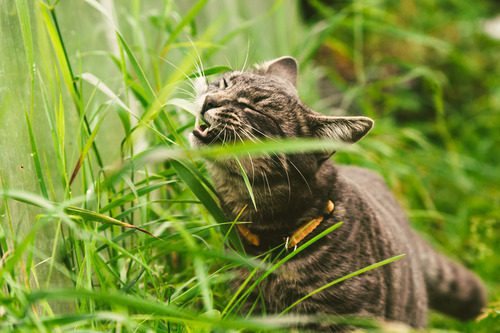Why Do Cats Eat Grass

Have you ever watched your cat nibble on a patch of grass and wondered why they’re munching on something that’s clearly not their usual cat food? While it might seem odd, this behavior is quite common among felines. The reasons behind why cats eat grass are varied and interesting, providing insights into their natural instincts and dietary habits. If you’re curious about this behavior, you’re not alone. Many cat owners notice their pets showing an interest in grass and other plants. In this blog, we’ll explore the reasons behind this behavior and what it means for your cat’s health. For any concerns or questions about your cat’s diet and habits, call our West Loop location at (312) 421-2275, or our Streeterville location at (312) 766-5959 to make an appointment with West Loop Veterinary Care.
Theories Behind Grass Eating in Cats
Nutritional Supplement
Cats are obligate carnivores, which means their diet primarily consists of meat. However, grass can be a source of fiber, which helps in the digestion process by aiding the passage of food through the intestines. While cats don’t need a lot of fiber in their diet, a small amount can be beneficial, especially for those that might suffer from indigestion or hairballs. Fiber helps move hairballs along the digestive tract, reducing the likelihood of vomiting.
Natural Instincts
Ancestral Diet
Looking back at their wild ancestors, domestic cats’ behavior of eating grass can be traced to a natural instinct. Wild cats often eat their prey whole, including the stomach contents of herbivorous animals, which contain partially digested plants. Eating grass could be a way for domestic cats to unconsciously mimic this aspect of their ancestor’s diet, adding roughage and possibly trace nutrients.
Self-Medication
Another theory is that cats use grass as a form of self-medication. They might eat grass to help relieve a sore throat or to induce vomiting to clear their stomach of indigestible matter like fur or parts of their prey in the wild. This behavior is a natural regulation method to cleanse their system of what might be uncomfortable or harmful.
Behavioral Aspects
Curiosity and Texture
Cats are naturally curious animals, and their exploration includes using their sense of taste and texture. Grass provides a very different texture compared to their regular dry or wet food. This texture might be intriguing for cats, and nibbling on grass could simply be a way to satisfy their curiosity or a play behavior, enjoying the sensation it provides.
Habitual Behavior
For some cats, eating grass can become a habitual activity, especially if they started at a young age. The behavior can be reinforced if they feel better after eating grass, particularly if it helps expel hairballs or if they were feeling nauseous beforehand. Regular exposure to grass, especially for indoor cats who have access to cat grass or houseplants, can lead to habitual nibbling.
Health Considerations
Ensuring Safe Grass Consumption
While eating small amounts of grass can be harmless and even beneficial for cats, ensuring that the grass they consume is safe is crucial. Grass treated with pesticides, herbicides, or fertilizers can be harmful to your pet. Providing a small tray of cat grass grown specifically for indoor pets is a good way to let your cat indulge in this behavior safely. If you notice excessive grass eating or any signs of distress following grass consumption, it’s advisable to consult with a veterinarian.
When to See a Veterinarian
Although occasional grass eating is normal, frequent or obsessive behavior might be indicative of a deeper issue. If your cat is eating grass and vomiting every time they go outside, or if they seem to be using grass as a substitute for their regular diet, it might be time to visit a vet. West Loop Veterinary Care is always here to help evaluate your cat’s health and behavior. Contact our West Loop location at (312) 421-2275, or our Streeterville location at (312) 766-5959 to schedule an appointment.
Monitoring Your Cat’s Behavior
Cats eat grass for various reasons, from dietary benefits to instinctual behaviors. Understanding why your cat engages in this behavior can help you ensure they remain healthy and happy. Remember, while some grass eating is normal, monitoring the amount and ensuring it’s safe are key to keeping your feline friend in good health. At West Loop Veterinary Care, we’re committed to providing your pets with the best care possible. Contact us today to discuss any concerns or questions about your cat’s habits or health.
West Loop:
(312) 421-2275
Streeterville:
(312) 766-5959
